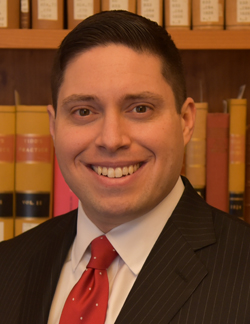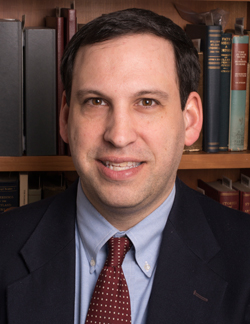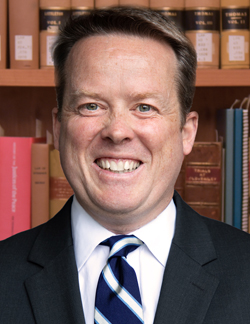Co-Director, the Project on Constitutional Originalism and the Catholic Intellectual Tradition, and Assistant Professor J. Joel Alicea's and Co-Director, Center for Religious Liberty, and Professor Mark L. Rienzi's articles were published in Notre Dame Law Review Vol.98, issue 1. Co-Director, the Project on Constitutional Originalism and the Catholic Intellectual Tradition, and Professor Kevin C. Walsh co-authored a book review, which was also published in the same issue. Below are the abstracts for Alicea's and Rienzi's articles, as well as the first paragraph of the introduction for Walsh's Book Review:
 The Moral Authority of Original Meaning
The Moral Authority of Original Meaning
J. Joel Alicea, 98 Notre Dame L. Rev. 1 (2022)
One of the most enduring criticisms of originalism is that it lacks a sufficiently compelling moral justification. Scholars operating within the natural law tradition have been among the foremost critics of originalism’s morality, yet originalists have yet to offer a sufficient defense of originalism from within the natural law tradition that demonstrates that these critics are mistaken. That task has become more urgent in recent years due to Adrian Vermeule’s critique of originalism from within the natural law tradition, which has received greater attention than previous critiques. This Article is the first full-length response to the natural law critique of originalism as represented by Vermeule, presenting an affirmative argument for originalism from within the natural law tradition. Although other theorists have offered natural law justifications for originalism, they have not yet developed a theory of legitimate authority, which is essential both to the natural law tradition and to originalism. This Article fills that gap by grounding originalism in the legitimate authority of the people-as-sovereign.
In doing so, it draws upon and adapts centuries-old natural law arguments in favor of popular sovereignty that have rarely been mentioned in American law reviews and have never been presented as the basis for originalism. By creating a novel synthesis between this natural law theory of popular sovereignty and originalism, the Article offers new responses to longstanding objections to popular-sovereignty-based originalist theories, such as the exclusion of women and enslaved Black people from the ratification process.
Finally, having answered those criticisms, the Article shows that obeying the original meaning of the Constitution is necessary to preserve the legitimate authority of the people, which is essential to achieving the common good. This allows the Article to confront the core of the natural law critique: that originalism is incompatible with the natural law because it privileges the original meaning above the natural law when they are in conflict. The Article demonstrates that this critique overlooks the natural law limits on judicial authority that undergird the common good. By grounding originalism in a moral argument drawn from the natural law, this Article shows that, far from being a morally empty jurisprudence, originalism is justified by the moral authority of original meaning.
 Religious Liberty and Judicial Deference
Religious Liberty and Judicial Deference
Mark L. Rienzi, 98 Notre Dame L. Rev. 337 (2022)
Many of the Supreme Court’s most tragic failures to protect constitutional rights—cases like Plessy v. Ferguson, Buck v. Bell, and Korematsu v. United States—share a common approach: an almost insuperable judicial deference to the elected branches of government. In the modern era, this approach is often called “Thayerism,” after James Bradley Thayer, a nineteenth-century proponent of the notion that courts should not invalidate actions of the legislature as unconstitutional unless they were clearly irrational. Versions of Thayerism have been around for centuries, predating Thayer himself.
The Supreme Court took a decidedly Thayerian approach to the First Amendment in the first flag salute case, Minersville School District v. Gobitis. That approach was short-lived, as Gobitis was swiftly overruled in West Virginia State Board of Education v. Barnette. Rather than deferring to political actors, Barnette treated the Constitution as placing certain rights “beyond the reach of majorities” and establishing them as “legal principles” that must be “applied by the courts.” Barnette’s approach to rights—rejecting a Thayerian “duty of deference” for First Amendment rights—has largely triumphed, even in other individual rights contexts.
But a curious anomaly persists. Unlike in other areas of the law, the discredited Thayerian approach to the First Amendment from Gobitis was eventually adopted into the modern free exercise standard embraced by the Supreme Court in Employment Division v. Smith. As a result, many free exercise claims have been decided with precisely the kind of rational basis deference we long ago abandoned for other constitutional rights.
This Article examines the relationship between religious liberty claims and Thayerian judicial deference. With the Supreme Court poised to reconsider Smith, this focus on deference differs from the standard scholarly and judicial approach, which tends to emphasize the debate over religious exemptions. Focusing instead on deference shows how Smith is an outlier, out of step not only with prior religious liberty cases but also with our broader approach to the enforcement of constitutional rights. Likewise, when religious liberty is viewed through the lens of deference, it becomes clear that, even without overruling Smith, the Supreme Court has been moving away from Thayerian judicial deference across a wide range of religious liberty disputes over the past decade. These deference-rejecting decisions cast the Religion Clauses as the “the heart of our pluralistic society,” that help “foster a society in which people of all beliefs can live together in harmony.” Those high goals are only attainable if religious liberty consists of judicially enforceable rights, rather than occasions for deference to the majoritarian governments that the Bill of Rights is supposed to constrain.
 Recovering Classical Legal Constitutionalism: A Critique of Professor Vermeule's New Theory
Recovering Classical Legal Constitutionalism: A Critique of Professor Vermeule's New Theory Jeffrey A. Pojanowski & Kevin C. Walsh, 98 Notre Dame L. Rev. 403 (2022)
Professor Adrian Vermeule has provoked renewed interest in the relationship between the classical natural law tradition and the Constitution of the United States with his book, Common Good Constitutionalism: Recovering the Classical Legal Tradition. As scholars self-consciously working in that tradition, we welcome contemporary attention to that perennial legal philosophy. Yet in reading and rereading the book, we found ourselves frustrated with it, notwithstanding the apparent agreement we shared with the author at some abstract level of principle. And that abstraction, it turns out, is just the problem with the book’s application of the classical legal tradition to constitutional law. All the right concepts are there for a sound approach to constitutionalism: understanding law as a reasoned ordinance, for the common good, authored by one with responsibility for the community, and promulgated. Too often, though, the only thing missing from this theory of constitutional law was a law, namely the Constitution of the United States.
